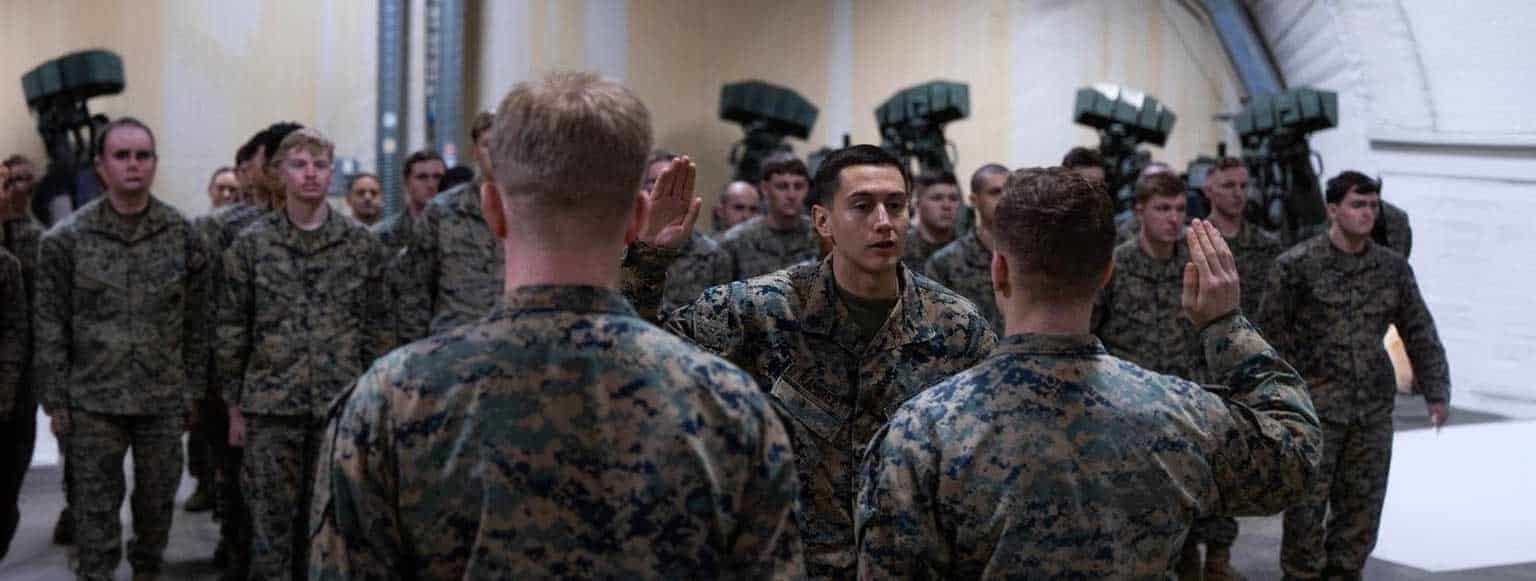Principles and Traits of Marine Corps Leadership, Part 9

When someone is sworn into a branch of the armed services, he takes an oath to protect and defend the Constitution of the United States against all enemies foreign and domestic. The purpose of a constitution is to establish a government of whatever form a people choose and to make clear what are that government’s powers, the limits on its powers, and the powers it does not have. In American political tradition, constitutions were written, ratified, and enacted for each state and for the federal government for the purpose of empowering governing institutions for limited and specified purposes thought necessary for securing valued ways of life Americans wanted to preserve. Men and women in the armed services are pledged to defend this arrangement because it is thought to preserve ways of life which people in general are willing to incur personal risk to protect. So, we may benefit from considering among ourselves how this defense of the Constitution is to be done. The Marine leadership principle of developing a sense of responsibility among a leader’s subordinates offers an interesting place to stand for thinking about this.
We may begin a reflection on promoting a sense of responsibility by insisting that oaths are be taken seriously, since here we are at the foundation of a person’s character. If we think of “moral evil,” as ancient and medieval thinkers often did, as the willful corruption of any kind of good, then we can say that lying is wrong because it is the willful corruption of the good of truth in speech. With this definition, it comes clear that violating an oath is a form of lying since it is reasonably presumed of someone taking an oath that the person is truthful and honorable and will keep his promise. When a Boy Scout recites the twelve traits of character he is to develop and maintain, he begins saying: “A Scout is trustworthy….” It is a foundational requirement of developing a sense of responsibility to an organization and its mission that the people in the organization are honest, and determined to keep promises and to speak truthfully.
The leadership principle of developing a sense of responsibility in Marines is interesting in that, in order to do it well, a Marine leader must be proficient with such other leadership principles as knowing self and seeking improvement, maintaining technical and tactical proficiency, knowing one’s Marines and looking after their welfare, keeping Marines informed, and setting the example. When someone is learning to do anything that requires skill developed through practice, it is helpful to observe people who do that thing well and emulate them. So it is important for a leader to set the example for others, but in order to do that, the leader must embody the skills and traits of character he is seeking to instill in others. We have observed here in the past that if people are to learn any skill, it is most helpful if they want to learn it. People generally will be more eager to serve the mission of an organization and to improve in the skills needed for the mission if they understand that their contributions are appreciated. How that is done must, it seems, depend largely on the leader and the working environment the leader maintains, but the difference between successful approaches and unsuccessful ones can be seen in the results.
With a sense of responsibility comes also accountability, and this is why it is important, among other things, to be committed to keeping oaths, vows, and promises which, one may think, come to the same thing. This is so because of the importance of personal development to professional development. Of course, it happens that people find their way into positions of leadership who are personally unsuited to it, but such people do not inspire in others the desire to perfect their skills owing to a sense of responsibility to the mission.
General Gray would say that if you aren’t teaching, you aren’t leading. This requires of the leader that he work steadily to improve his knowledge and skills, and it is the uniform experience of people engaged in a conscious and focused effort at learning something that he will make mistakes which must be identified and corrected.

When this process is done well, it results in a gradual and wider-reaching clarity of understanding. For the process to work well, at least four characteristics of mind are useful: curiosity, discipline, patience, and honesty. A leader so equipped can assign tasks and delegate authority, then see to the successful accomplishment of tasks. When tasks are performed well, it is important for leaders to recognize this, and where performance falls short, correction and criticism should be constructive. Where inadequate performance is the result of error or insufficiently developed ability, and not of dereliction or dishonesty, the Marine should not be treated as if he is dishonest. In this way, learning takes place, the Marine understands that he is growing under the instruction of his leader, and this has the effect of developing a sense of responsibility to the mission because the Marine, whether praised or corrected, is clearly a member of the team.
In his great work “Confessions”, St. Augustine (d. 430 A.D.), a Christian bishop in North Africa, has an extended discussion of the nature of time. He begins by saying that if he doesn’t think about it, he knows what time is, but if he thinks about time, he’s not sure what it is. The Marine leadership trait of bearing is rather like this. Is it standing up straight? Keeping one’s elbows off the dinner table? Hands out of pockets? Manners, dress, speech? All of these? One reads in some discussions of bearing that it includes how others perceive you. While it may be true that one can have an influence on how he is perceived by how he presents himself, the perceptions others have of you are theirs and not yours, and so it is prudent not to put much weight on the perceptions of others in determining the quality of bearing.
However, whether or not one is a Marine, physical conditioning is an important part of bearing. In an essay on differences between Americans and Englishmen on expected ways of behaving in public, Albert Jay Nock expresses clear disapproval of the English concept of the gentleman, since it is a station of life into which one is born rather than the quality of a man’s way of life. In commenting on this, Nock says if he meets a man who looks good in a suit, he may not know if he is a gentleman in the English sense, but in the American sense, he probably is. Nock could say this because he believed that in order to wear clothes well, one has to pay attention to it, and this requires concern for being developed as a human being rather than simply appearing to be developed. Empty suits quickly reveal themselves as empty.
We may conclude, therefore, that the seemingly indefinite trait of bearing can seem this way because it brings to bear the full array of principles and traits of leadership that are held by those who possess in the highest degree the qualities of a leader of Marines. People who are in the process of developing and growing both as a human being and as a Marine, or in any other profession, develop a personal style that is their own. That style, in mannerisms, dress, speech, and habits of life more generally, when marked by discipline of both mind and body, may be called bearing. In a Marine leader, this quality is important to setting an example for other Marines, and because bearing can inspire confidence in others, it contributes to developing in others the important sense of responsibility to organization and mission.


